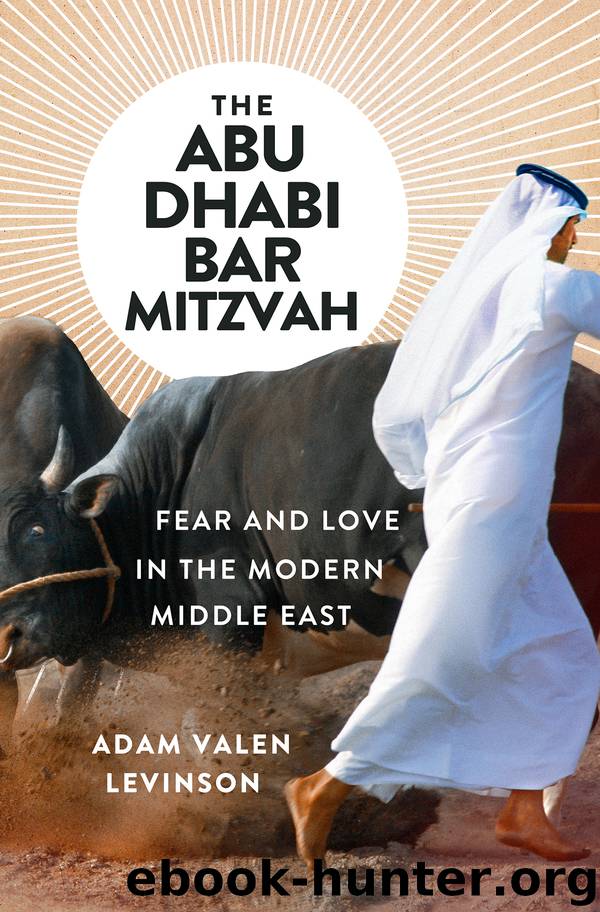The Abu Dhabi Bar Mitzvah by Adam Valen Levinson

Author:Adam Valen Levinson
Language: eng
Format: epub
Publisher: W. W. Norton & Company
Published: 2017-11-23T05:00:00+00:00
“Before going to India, no—I said, ‘I’m a Muslim.’ Only me who is being in God, not even Christian or Jewish. But after going to India, no, I said ‘No: humanity. Then religion.’ ”
“I have friends online from Israel,” he said. “I have three, four friends, they are coming here.”
Like most in Erbil, Sulaymanians speak Sorani, Central Kurdish, written in a variety of Persian script. When I asked what its influences might be—Sanskrit, Persian, Turkish, Arabic?—Rebaz reacted with an uncharacteristic jolt, “No no no no, no Arabic.” Rebaz took a terse sip of tea, as if to wash away the mere hint of a suggestion of an aftertaste of Arabic. Kurdishness was clarified faintly for what it was not.
Syria, before it was a government slaughtering its people, had its fault lines drawn along religious borders. The Kurdish population is predominantly Muslim, so the conflict is portrayed as an ethnic one supported by ancestry. Rebaz narrated a variation on a familiar story while Ali nodded affirmation behind his glass: “We are from different roots. The beginning of the story is one old man had three guys, three sons from different tribes. Sami is Arab ancestor, Hami is European ancestor, Ari is our ancestor. They are calling them ‘Hindo-European’; this part is Kurdish people, Persian people, even Pashto—Pakistan and Afghanistan—part of the Soviet Union, now Tajikistan, Uzbekistan, Turkmenistan—all they come through same ancestor.”
His retelling outlined the story of Noah’s three sons, known in the Abrahamic tradition as Sham, Ham and Japheth. Sham (Sami) is the mythological father of the Semitic races; he is Abraham’s great great great great great great great grandfather; in Persian and Arabic, Sami means “Semite.” In Arabic, it also means “supreme.”
Biblically, Ham is the son who moves into Africa, while Japheth relocates toward the Mediterranean. Rebaz had forgotten about Africa, but with one minor change the story matched: Ari was Japheth, the forefather of Indo European peoples. “Our ancestor is called Ari—in Kurdish language, in Sanskrit language, it means ‘fire.’ Born of fire. Because we have even our own prophet and our own religion, which is called Zardasht, Zoroastrian. They are worshipping, they respect fire.”
In Sanskrit, arya means “noble.” These are the world’s Aryans. And in the words I could see the migrating populations: Zoroastrian Aryans brought fire temples to Persia, giving Iran its name. Later, when Zoroastrians moved into South Asia, they were dubbed Parsi—the word Persian in Persian. The word for the people became the word for the place. Then, the word for the place became the word for the people.
Nationality invoked a mythical lineage and language evolved to support its supremacy. Words and identities and religion aged in constant feedback with one another, and soon, the seams of this social stitching were cloaked in imagination and history.
“It’s not about belief,” Rebaz said. “It’s about story.” But, he admitted: “Even I don’t know much about it because I’m into science more!”
Kurds consider themselves the indigenes who survived Islamic conquest, even though the Islamic influence stuck. Rebaz
Download
This site does not store any files on its server. We only index and link to content provided by other sites. Please contact the content providers to delete copyright contents if any and email us, we'll remove relevant links or contents immediately.
The Rosie Effect by Graeme Simsion(2704)
The Mind Map Book by Tony Buzan(2075)
Come, Tell Me How You Live by Mallowan Agatha Christie(1764)
Top 10 Dubai and Abu Dhabi by DK Travel(1713)
Iranian Rappers And Persian Porn by Maslin Jamie(1706)
Belonging by Unknown(1459)
A Heartbreaking Work of Staggering Genius by Dave Eggers(1360)
Bitter Lemons of Cyprus by Lawrence Durrell(1290)
Zeitoun by Dave Eggers(1221)
In Arabian Nights by Tahir Shah(1199)
The Abu Dhabi Bar Mitzvah by Adam Valen Levinson(1198)
The Great Railway Bazaar: By Train Through Asia by Paul Theroux(1178)
House of Stone by Anthony Shadid(1121)
The Saffron Tales by Yasmin Khan(1121)
Fast Times in Palestine by Pamela Olson(1113)
Istanbul Travel Guide by Lonely Planet(1074)
Twain, Mark - The Innocents Abroad by Twain Mark(1074)
Top 10 Israel and Petra by DK Travel(1067)
Gertrude Bell by Georgina Howell(1046)
